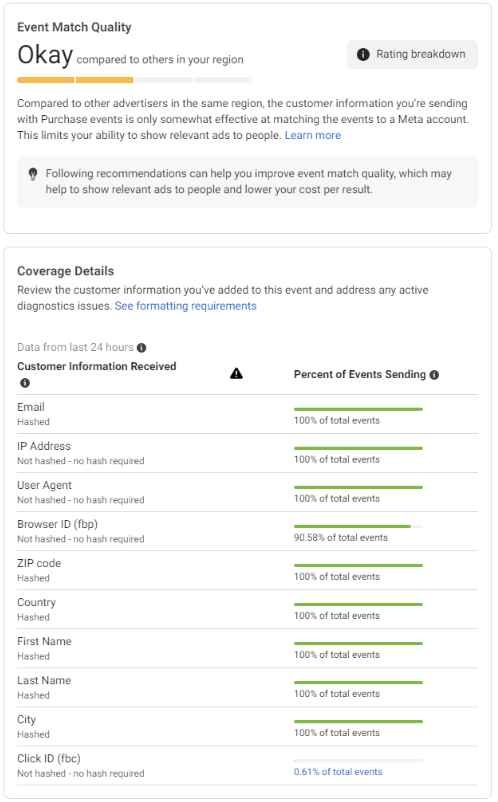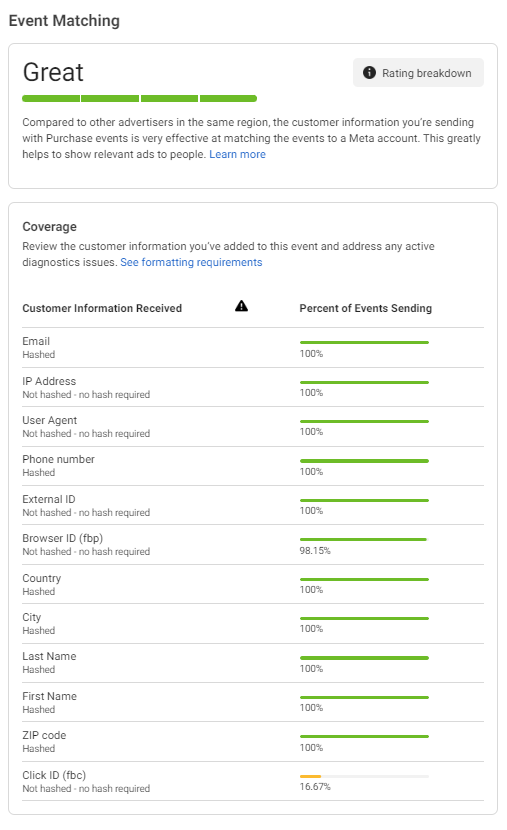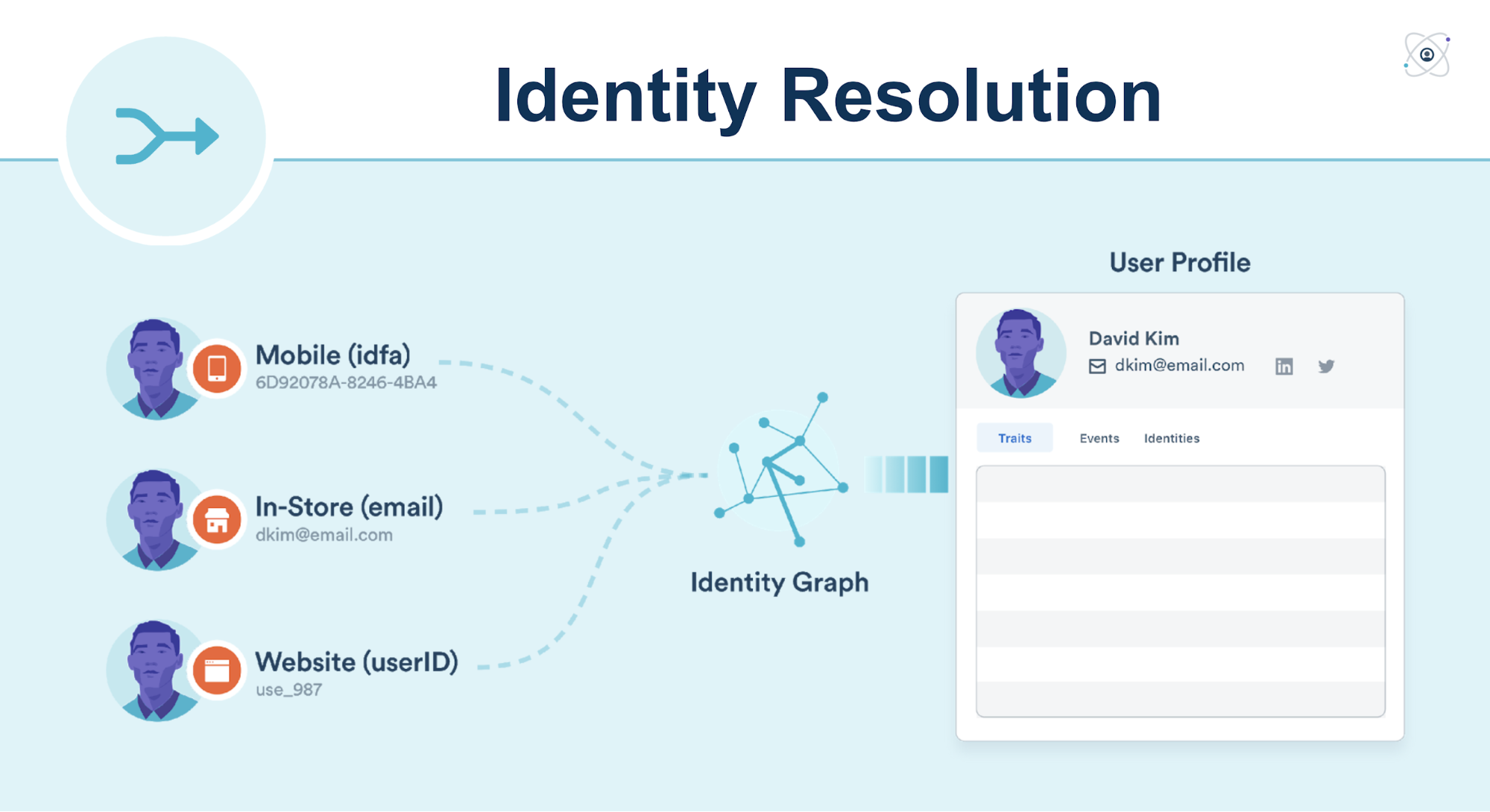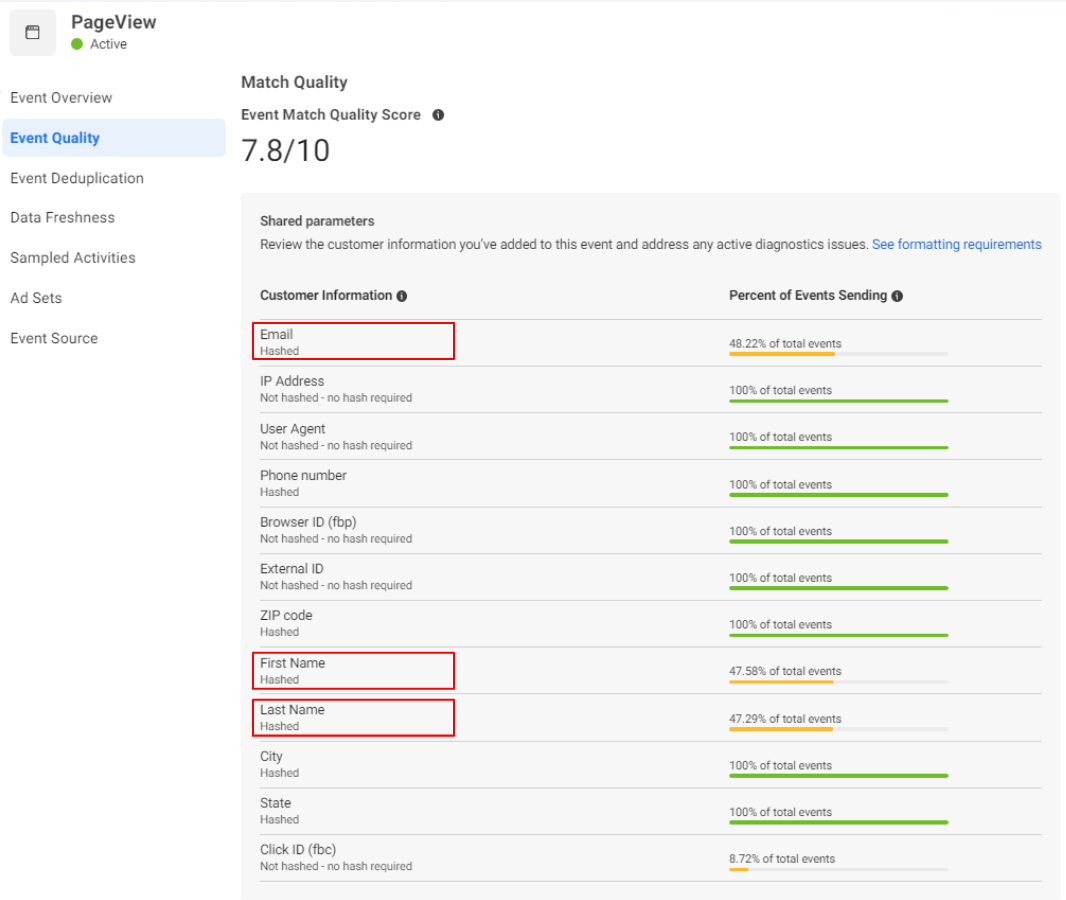What are Meta Event Matching Scores and Why Do They Matter?
Understanding Event Matching Scores
Event matching scores are indicators used by Meta (formerly Facebook) to measure the quality of data sent from websites to its advertising platform through the Facebook pixel or Conversions API. These scores reflect how well user events on a website, such as page views or purchases, are matched to user profiles on Meta. Improving event matching quality increases the likelihood of accurately associating events with a Meta account, thus potentially boosting conversion rates and reducing the overall cost per conversion.
How Event Matching Scores Are Calculated and What They Mean
The event matching score hinges on the accuracy and depth of the data captured. Meta calculates a score out of 10, considering the quality of customer information sent and the ability to successfully link events to specific Meta accounts. For instance, let’s take the example of a purchase event, where data points like email address, first name, and last name are uniquely associated with a Meta account. If your event data includes these specific details, the event can be associated with a specific Meta Account.
Then your event matching score is then compared to other regional advertisers sending similar events, categorizing your performance as ‘Poor’, ‘Okay’, ‘Good’, or ‘Great’. Meta recommends pursuing a ‘Good’ or ‘Great’ event matching score.
- Poor: The customer information you’re sending with your event is ineffective at matching the event to a Meta account.
- Okay: The customer information you’re sending with your event is only somewhat effective at matching the event to a Meta account.
- Good: The customer information you’re sending with your event is effective at matching the event to a Meta account.
- Great: The customer information you’re sending with your event is very effective at matching the event to a Meta account.
Why is Meta Event Matching Quality Important?
Enhancing Event Matching Scores Leads to More Accurate Attribution
Increasing your event matching score on Meta enhances attribution accuracy by correctly associating website actions, such as purchases, with the appropriate Meta user profiles. When a purchase on your site aligns with a Meta account, the attribution is more reliable, as Meta can determine if that user had previously interacted with your ad. This precise connection allows for a more confident attribution of conversions to specific ad engagements, providing a clearer insight into the effectiveness of your advertising spend (ROAS).
Enhancing Event Matching Scores Leads to Better Targeting
Improving your event matching score leads to a more defined target and retarget audience, as it ensures a more accurate match between the data from your website and the appropriate Facebook users. This enhanced accuracy serves two essential functions:
- Enhanced Retargeting: Accurate data matching allows for more effective retargeting of individuals who have already interacted with your site, potentially increasing engagement and conversion rates.
- Improved New customer targeting: Precise customer data alignment aids in the identification of ‘lookalike’ audiences, making it easier to find and target new customers who share characteristics with your existing audience.
The outcome is a boost in the effectiveness of your ad campaigns, as your ads are more likely to reach those who have a genuine interest in your products or services.
Improving Your Meta Event Matching Score
The more customer data parameters for an event shared with Meta, directly increases the overall event match quality and the increase the likelihood of matching events to the respective Facebook accounts. Meta leverages a variety of customer data parameters for event matching, including:
- Personal Information: First name, Last name
- Identification Tags: fbp (browser ID), fbc (click ID)
- Contact Details: Mobile number, Email
- Platform Identifiers: Facebook login ID
- Device and Location Info: IP address, User agent, Address (city, state, postcode, country code)
- Demographics: Date of birth, Gender
- Unique Identifiers: Subscription ID, External ID
Prioritizing Parameters: Which Matter Most?
While every parameter adds value to the matching score, certain data points hold more weight:
1) Essential Parameters:
- Hashed Email and Phone Number: These are vital for uniquely identifying users. Hashing ensures security while maintaining the ability to match individual users accurately.
2) Supportive Parameters:
- Client IP Address: Provides geographical and network-related information of the user.
- Client User Agent: Reveals the user’s browser type and operating system, adding context to their device usage.
- Facebook Login ID: Useful for linking onsite activities with Facebook profiles, particularly for users logging in through Facebook. This parameter does not uniquely identify users but contributes to a more complete user profile.
3) Secondary Identifiers:
- Browser ID (fbp): Tracks individual browser sessions, enhancing retargeting accuracy by identifying the specific browser used by the user.
- Click ID (fbc): Captures which specific ad was clicked by the user, crucial for linking ad interactions to subsequent user behavior on your site.
4) Additional Data Points:
- Hashed Contact Information: Includes details like gender, date of birth, and location. These are essential for demographic targeting and understanding cross-platform user behavior.
The Role of Parameters in a Cookieless World
In the current digital environment, where privacy concerns are leading to the phasing out of third-party cookies, parameters emerge as essential tools for event matching. These parameters are first-party data points collected directly from users, including email addresses, phone numbers, names, locations, and browser details. Unlike the now declining use of third-party cookies for tracking user behavior, these parameters offer a more privacy-compliant way to match events to users. These parameters provide a reliable means to understand and target user behavior without relying on third-party cookies.
How Parameters Vary Across Key Events
- Upper Funnel Events: The ‘upper funnel’ refers to the early stages in a customer’s journey where interactions like PageView, ViewContent, AddToCart, and InitiateCheckout occur. At this point, visitors typically haven’t provided personal details like email addresses, resulting in limited customer information being available. Meaning that a lower amount of parameters can be passed to Meta
- Lower Funnel Events: Conversely, the ‘lower funnel’ involves later stages where customers are more committed, engaging in actions such as AddPaymentInfo, Purchase, Lead, and CompleteRegistration. Here, customers usually provide personal information, leading to a richer set of data that can be transmitted to Meta.
Generally, it is preferred to transmit the most comprehensive set of customer data, meaning as many parameters as possible to Meta. This increases the likelihood of accurately matching events to the correct user profile.
Let’s look at an example. The Purchase Event Quality below is currently at ‘Okay’. According to Meta, the event quality should be ‘Good’ or ‘Great’. It already incorporates most of the previously seen parameters, but the score could be improved by incorporating ‘Phone Number’ and ‘External ID’. We also notice a low number of Click IDs registered.


Enriching Parameters by Utilizing Identity Resolution
In the digital advertising funnel, events like PageView, ViewContent, AddToCart, and InitiateCheckout often possess limited customer information since they typically occur without user login or account creation. To counter this challenge and enhance the data sent to Meta, the use of identity graphs becomes valuable.
Identity graphs work by collecting and aggregating various identifiers, such as email addresses, first names, last names, IP addresses, and Browser IDs gathered from user interactions across different sessions and touchpoints. This aggregation allows for the creation of a more comprehensive user profile.

For example, consider a PageView event in a user’s current session where they haven’t logged in. Through data enrichment, you can append additional information like an email or name from a previous session where the user might have provided these details during a later funnel event (e.g., a Purchase or CompleteRegistration event). This is achieved by linking identifiers collected across different interactions to form a unified view of the individual.

Converge facilitates this integration, enabling the enrichment of event data. By adding such detailed information to upper-funnel events, you significantly increase the accuracy of your event matching on Meta. This effectively bridges the gap between limited early interaction data and more comprehensive later stage data, enhancing overall marketing efficiency.
Conclusion
Meta event matching scores play a crucial role in the data-driven landscape of digital advertising. Boosting these scores enables advertisers to attain more accurate attribution, which directly contributes to more efficient targeting and an increased return on ad spend (ROAS). Improving these scores involves a two-pronged approach: firstly, maximize the collection of diverse parameters for each event to ensure a detailed and rich dataset; and secondly, enrich these events by integrating previously captured parameters from other stages in the customer journey by leveraging identity graphs.